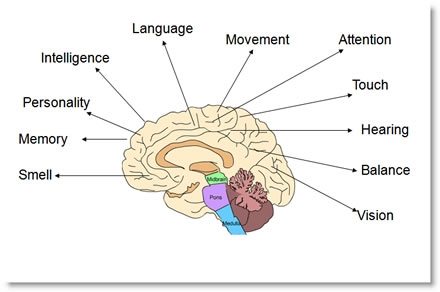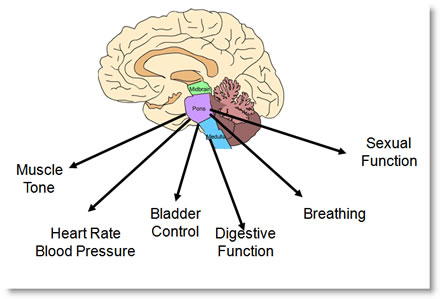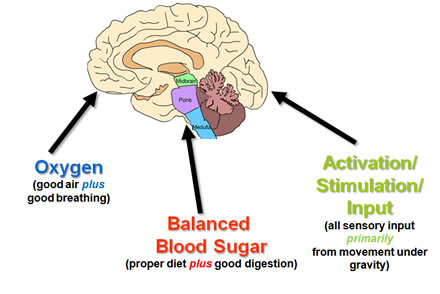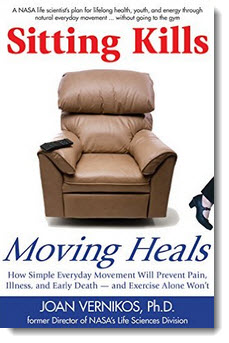
 |
"The doctor of the future will give No Medicine, but will interest his patients in the care of the Human Frame, in Diet, and in the Cause and Prevention of Disease." |
||||||||||||||||||||||||||||||||||||||||||||||||||||
Today's Topic: Your Brain and Chronic Illness When in Doubt, Look to Your Brain
Neuropsychiatric/Brain Disorders are #1 Your Brain controls All Functions Western Medicine -> Symptom Suppression
What Your Brain Needs - The Three Pillars of Brain Health
Among those are
There are many other chronic illnesses that plague human kind today. Among those are
Your Brain Controls ALL Functions - The Neurological Connection
In other words, any abnormality in any of the above could be - and often is - due to an imbalance or improper functioning brain function. What We Tend to Have a Common As We Get Older
All these are signs of decreased brain function.
My question to You:
Western Medicine - Symptom Suppression
"The true reason" for your ill health is most always a lack of pharmaceutical medications. Look at the insanity of current television advertising: (I hope you notice my bitter sarcasm) Heartburn is simply due to lack of the "purple pill". It could not possibly have anything to do with the foods you eat, your weight, the health of your digestive tract, your health history, your history of antibiotic use, or the state of your brain health.
High blood pressure is simply due to the fact that you are old, getting old, or better yet, due to the fact that you do not consume enough blood pressure medication. It could not possibly be related to lack of physical movement under gravity, exercise, the kinds of foods you eat, and to an imbalance or decrease in brain function.
Depression, anxiety, manic-depressive disorders, ADD, ADHD ... we do not really know why they occur. The drug companies seem to have the right idea: It must have something to do with the brain. Oh, yes! God made a mistake: He failed to put enough Prozac into your breakfast cereal. But we can correct this easily! Have you ever read the potential side effects of the currently so popular anti-depressants?
And then there is Ritalin - a chemical relative to amphetamines. Cautious people call this "brain stimulant". Others call this "Speed". I was under the impression that we decided that amphetamines were not such a good idea for grown-ups. We actually put those in jail who make it or consume it. But amphetamines in the form of Ritalin are probably OK for our children and teenagers. Their developing brains can handle "Speed" better; it is actually good for them. Again, please note that some of my above comments are meant to be sarcastic.
Fibromyalgia
means that your muscles hurt. Muscles in Fibromyalgia patients tend to
be tender to touch. They often feel tight. Current research indicates
clearly that in most cases there is nothing wrong with the muscle tissues.
There is no evidence of chronic inflammation of the muscles. The question
becomes: why do the muscles hurt?
The perception and processing of pain information happens in your brain. Without your brain you could not have the opportunity to experience pain. Phantom pain is an interesting example of how the brain works. People who have lost a leg, for example, will complain of toe pain on that side, even though they have no toes. How is that possible? All we can say: the area of the brain that represents the pain perception of the toes is activated. Why, we cannot state, at least not in this context. This leads to the subjective experience of pain, even though there are no pain fibers from the toes to the brain. All sensory information from the periphery, including pain, is channeled through the Thalamus to the cortex. The Thalamus is the main relay for all incoming sensory information.
Our brain has two functions with respect to pain perception. One area of the brain receives the incoming pain fibers from the periphery via the Thalamus in order to facilitate the experience of pain. Another area of the brain fires down to the Thalamus to inhibit and dampen that transmission of pain. Here is an important thing to remember: pain fibers, similar to other neurons, fire at all times. This is essential to their survival. If they did not fire, they would degenerate and eventually die.
If it were not for the pain inhibition of the cortex, we would experience pain at all times. The problem arises when normal brain function declines in one or both brain hemispheres. The brain's capacity to inhibit pain perception would decline. This could lead to what we call intractable pain syndromes. The most difficult and frustrating cases for many of us in the health care field are those patients who present with these pain syndromes, with no history of trauma to explain them. These people simply hurt. Medication of varying strength has been used extensively, with less and less effectiveness. The biggest
mistake we all tend to make is to look only at the area of pain. There
has to be an explanation for this person's suffering right there. When
we cannot find a physical reason, we either give up, or we declare that
it must be "psychological", that "it is all in your head".
We give it fancy names such as "psychosomatic", etc.
Most of these names only cover up our helplessness and ignorance as to the true cause of their suffering. Actually, it may well be all "in their head". Besides looking at the area of pain, it is of vital importance to also investigate brain function. Once we understand that normal brain function is designed to inhibit pain perception, we must look for a way to evaluate the person's brain state. A neurological examination by a skilled chiropractic neurologist will easily reveal brain hemisphericity, the relative under-functioning of one brain hemisphere compared with the other.
Once we have determined that there is no pathology in the area of pain, or anywhere else for that matter, we then have to decide how to best increase the function of the under stimulated brain hemisphere. The strongest sensory feedback from the periphery to the brain is via large diameter myelinated nerve fibers (Ia fibers), especially those from joint mechanoreceptors and muscle spindles. Brain hemisphere specific chiropractic adjustments on the side of the body opposite to the brain hemisphericity are exquisite ways to activate the brain function where it is needed. The brain can also be stimulated with light, sound, smell, taste, movement, etc. For a successful outcome it is vital that all therapies are brain based. Their application must have a sound neurological basis. If you stimulate the "wrong" side, you may end up making the brain hemisphericity worse. This may lead to increased pain perception. What Your Brain Needs - What YOU Can Do Today
The Three Pillars of Brain Health
II. Balanced Blood Sugar - Proper Nutrition and Digestion
Sugar at high levels is toxic to nerve cells. Diabetes is the primary example what happens to the nervous system when blood sugar levels are too high. The nerves actually die. You end up with diabetic neuropathies. Amputation of limbs may follow. Reactive hypoglycemia - low blood sugar - is equally dangerous. Many people on high carbohydrate diets suffer from dramatic blood sugar swings. The brain and the peripheral nervous system require an even and constant supply of glucose. When blood sugar levels drop too low, too fast, neurons are unable to function properly. They get stressed and may actually die. In order to improve brain and nervous system function it is thus vital to reduce carbohydrate intake, especially sugar.
We have forgotten that fat is not what makes us fat. For years, we have been told to eat low protein and low fat diets. We are so concerned with our weight! We failed to realize that it is the carbohydrates that make us fat. So we drink soda pop laden with sugar, eat pasta and bread, cookies and cakes. And we wonder why we keep expanding. Nobody reminded us that a big part of our brain is fat, that fat surrounds the nerves of the spinal cord and the periphery. Fat is the protective sheath, the insulation. Fat is essential. Without proper amount of fat, our nervous system is subject to malfunction, injury and damage. With our low fat craze we have done plenty of damage to our nervous systems over the years. With our low fat craze we are damaging the nervous systems of our children.
Proteins are the building blocks for living matter. Proteins consist of amino acids. Essential amino acids must be eaten; they have to be derived from food sources. They cannot be made in the body or by the body. Proteins are vital for the electrical properties of the neurons. Proteins are vital for all cells. A lack of protein leads to inadequate neurological functioning.
The "best" diet is useless if you cannot digest what you eat and absorb what you digest. Inadequate digestive functions leads to malnutrition. Ultimately your brain cannot function properly. Your brain governs ALL human functions. Consequently ALL aspects of your life can be negatively affected. In order to improve brain and nervous system function, adequate digestion and dietary modifications are of utmost importance.
Order the Four-Week Health Express to start balancing your Blood Sugar and improve your Diet and Digestive Function III. Upright Movement under Gravity and Exercise
We sit, many of us for long hours at a time. Increased sedentary lifestyle, long TV viewing hours, and endless computer sessions at home and at work, long automobile commuting hours,.... all this has impacted our brain health. The dramatic upswing in ADD/ADHD, autism, learning disabilities and behavioral problems over the past 20 years can be directly linked to the appearance of TV and VCR. Many kids don't move anymore. Obesity and the consumption of junk foods among American children are escalating. The same holds true for our adult population.
Our bodies are designed to move.
Find out Why Sitting Kills!
What some of Dr. Z's clients say . I wish you well. Thank you again for your interest and support. Dr. Z
Peter Zeischegg, MS, DC, DACNB
Visit our website. ODDHC - Oxygen Enriched Air, Diet, Digestion, Hypoglycemia/Blood Sugar, Candida © Copyright Dr. Peter Zeischegg MS, DC, DACNB, 2015. All Rights Reserved. |
|||||||||||||||||||||||||||||||||||||||||||||||||||||





